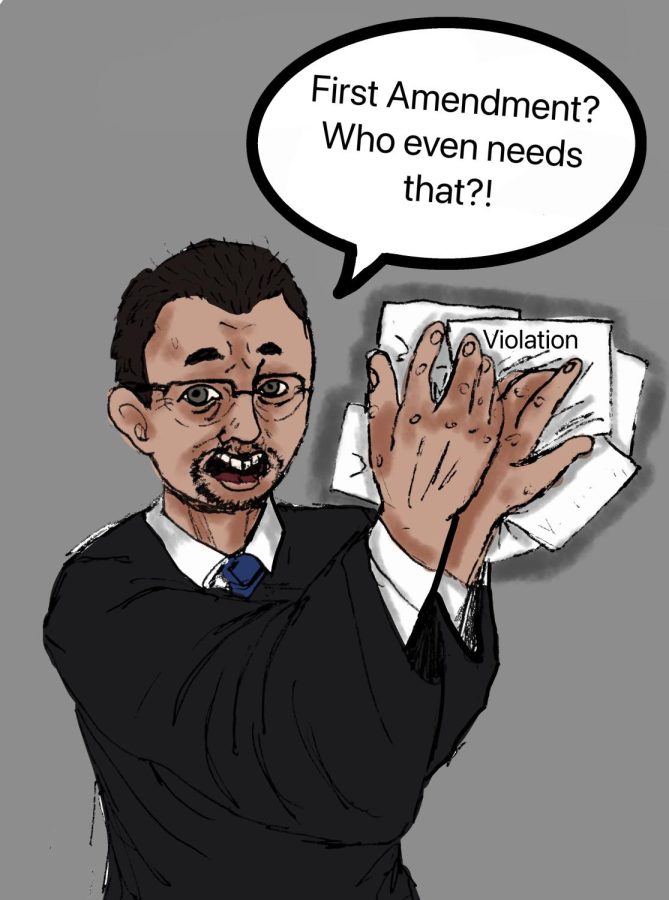Our view: The First Amendment should not inhibit information
November 17, 2022
The First Amendment has been cited throughout our history since the 1700s. Because of its importance, many people may use it in cases regarding social media usage, prayer at public schools, state funding of religious campaigns and peaceful protests across the United States. Although the examples mentioned above can happen relatively anywhere, Murray State recently cited the First Amendment as reasoning for denying an open records request.
Former 42nd Circuit Judge Jamie Jameson has been under fire for several charges of judicial misconduct, all of which the Judicial Conduct Commission found him guilty. Jameson’s appeal with the state Supreme Court is pending, but he was disqualified from presiding over criminal cases in the 42nd Judicial Circuit.
The charges regard his activity and behaviors in the courtroom. His reported misconduct includes pressuring attorneys, retaliatory behavior and trying to use his position to manipulate media coverage, according to the JCC’s report. In addition to the blatant misconduct, alleged video footage shows him walking around the courthouse “in [his] underwear.”
In early April, WKMS 91.3 filed an open records request seeking this footage of Jameson. The request was denied, and news director Derek Operle decided not to appeal, according to WKMS.
Despite his decision not to appeal, Jameson contacted former station manager Chad Lampe, saying he “had already spoken” with both MSU President Bob Jackson and Provost Tim Todd regarding the request and “the President was not happy,” according to the JCC’s report.
As a result, Jameson was charged for using his influence in an attempt to pressure WKMS to remain silent. The JCC maintained their charges because they believed Jameson had been using intimidation tactics such as this to exert his influence and use his power as a judge to make things go in his direction, according to WPKY 103.3.
Once this came to light, WPSD News Director Perry Boxx filed an open records request for the communications between Jameson, Jackson, Todd and others. The University denied the request overall and cited the First Amendment as one reason for denial.
Although the First Amendment was used, many people believe Murray State should have accepted the request in order to provide transparency within the university setting.
At The News, we believe the University was correct to say the request may have been burdensome. The request itself was not entirely narrow and ultimately left out specific information such as important dates.
Despite the request being broad, the University should not have cited the First Amendment as grounds for denial. The News believes the citation of the First Amendment was unfounded.
“The First Amendment does not implicitly or explicitly prohibit the disclosure of public records or information,” according to the Kentucky Open Government Coalition. Based on this information, the University was not within the grounds to use the First Amendment since it does not provide protections for public records and information.
It can still be questioned why the request itself was ultimately denied. Releasing the request would have made all parties look less guilty depending on the content of the communication, but it certainly looks more suspicious when the records are heavily redacted.
By denying the request, the University is giving into personal interests and looking to protect themselves. The biggest question is what exactly they are trying to protect.
Attorneys on behalf of Boxx and WPSD filed an open records appeal that could lead to an opening of the case. If the records are accessed, they could contain information crucial to the Jameson case. In addition, these records could reveal significant contact between University officials and Jameson.
When we think of journalistic suppression, we tend to think of national cases, but this is proof of suppression happening on a local level. Journalistic suppression denies local journalists freedom of the press, infringing on their First Amendment rights.
At The News, we call on the University as a public institution to uphold the five freedoms of the First Amendment of the U.S. Constitution. Withholding these records from WPSD goes directly against the First Amendment right to freedom of the press, contradictory to the University’s argument.



























































































